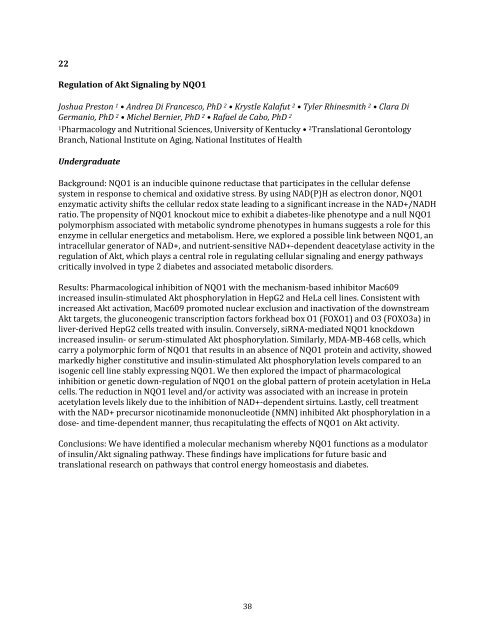2017 Cardiovascular Research Day Abstract Book
Create successful ePaper yourself
Turn your PDF publications into a flip-book with our unique Google optimized e-Paper software.
22<br />
Regulation of Akt Signaling by NQO1<br />
Joshua Preston 1 • Andrea Di Francesco, PhD 2 • Krystle Kalafut 2 • Tyler Rhinesmith 2 • Clara Di<br />
Germanio, PhD 2 • Michel Bernier, PhD 2 • Rafael de Cabo, PhD 2<br />
1Pharmacology and Nutritional Sciences, University of Kentucky • 2 Translational Gerontology<br />
Branch, National Institute on Aging, National Institutes of Health<br />
Undergraduate<br />
Background: NQO1 is an inducible quinone reductase that participates in the cellular defense<br />
system in response to chemical and oxidative stress. By using NAD(P)H as electron donor, NQO1<br />
enzymatic activity shifts the cellular redox state leading to a significant increase in the NAD+/NADH<br />
ratio. The propensity of NQO1 knockout mice to exhibit a diabetes-like phenotype and a null NQO1<br />
polymorphism associated with metabolic syndrome phenotypes in humans suggests a role for this<br />
enzyme in cellular energetics and metabolism. Here, we explored a possible link between NQO1, an<br />
intracellular generator of NAD+, and nutrient-sensitive NAD+-dependent deacetylase activity in the<br />
regulation of Akt, which plays a central role in regulating cellular signaling and energy pathways<br />
critically involved in type 2 diabetes and associated metabolic disorders.<br />
Results: Pharmacological inhibition of NQO1 with the mechanism-based inhibitor Mac609<br />
increased insulin-stimulated Akt phosphorylation in HepG2 and HeLa cell lines. Consistent with<br />
increased Akt activation, Mac609 promoted nuclear exclusion and inactivation of the downstream<br />
Akt targets, the gluconeogenic transcription factors forkhead box O1 (FOXO1) and O3 (FOXO3a) in<br />
liver-derived HepG2 cells treated with insulin. Conversely, siRNA-mediated NQO1 knockdown<br />
increased insulin- or serum-stimulated Akt phosphorylation. Similarly, MDA-MB-468 cells, which<br />
carry a polymorphic form of NQO1 that results in an absence of NQO1 protein and activity, showed<br />
markedly higher constitutive and insulin-stimulated Akt phosphorylation levels compared to an<br />
isogenic cell line stably expressing NQO1. We then explored the impact of pharmacological<br />
inhibition or genetic down-regulation of NQO1 on the global pattern of protein acetylation in HeLa<br />
cells. The reduction in NQO1 level and/or activity was associated with an increase in protein<br />
acetylation levels likely due to the inhibition of NAD+-dependent sirtuins. Lastly, cell treatment<br />
with the NAD+ precursor nicotinamide mononucleotide (NMN) inhibited Akt phosphorylation in a<br />
dose- and time-dependent manner, thus recapitulating the effects of NQO1 on Akt activity.<br />
Conclusions: We have identified a molecular mechanism whereby NQO1 functions as a modulator<br />
of insulin/Akt signaling pathway. These findings have implications for future basic and<br />
translational research on pathways that control energy homeostasis and diabetes.<br />
38


